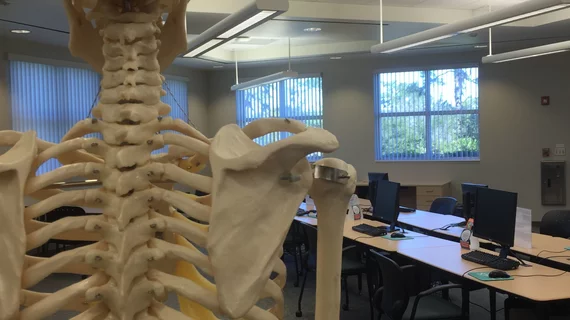Point-of-care ultrasound instruction that is less than comprehensive risks boosting trainees’ perceptions of relative proficiency without building their objective expertise in image interpretation.
Image-acquisition skills weren’t helped much by the abbreviated curriculum either, according to the authors of a pilot study whose trainees were 23 internal medicine residents.
The research was conducted at Saint Agnes Medical Center in Fresno, Calif., and published June 14 in Cureus [1].
Corresponding author Arielle Houston, MD, and colleagues found that POCUS interpretation scores suffered from a lack of periodic hands-on training sessions.
Meanwhile POCUS image-acquisition training was set back by the residency program’s temporary shelving of a plan to purchase an image-management platform that would have allowed ongoing feedback from faculty.
Both curtailments were occasioned by COVID-associated restrictions, including social distancing requirements and financial restraints.
In the study report, Houston and co-authors describe their work conducting a prospective, pre-, and post-curriculum pilot study to examine the POCUS skills of categorical internal medicine residents.
The original cohort comprised 41 residents; of the 23 who completed pre- and post-curriculum tests, 12 were interns and 11 were senior residents.
Heading into the program, 18 of the 23 residents, or 78%, said they had received no formal exposure to POCUS during medical school.
On results analysis, the authors report, the interns showed a statistically significant improvement in the confidence level in almost all diagnoses except pulmonary embolism.
However, in image-interpretation testing, this subgroup improved significantly only in two of eight tasks (recognizing two signs of pneumothorax).
At the same time, the residents recognized their need for more POCUS training. Some 21 of the 23, or 91%, indicated their interest in POCUS as extreme or even higher.
In their discussion, the authors note that POCUS is “gradually becoming an essential part of internal medicine training and can aid in diagnosing various medical conditions and may help change management.”
More:
In our pilot study, we found that only first-year residents’ confidence level, but not image interpretation skills, improved with a curriculum that was interrupted by the pandemic and accordingly lacked some elements of a longitudinal curriculum such as periodic hands-on training and image-saving platform. We hope to reinstate this curriculum during the upcoming academic year and analyze the differences in results during the pandemic and post-pandemic training period.”
Cureus is an open-access journal. Read the full study.
More Coverage of POCUS:
Cross-sectional imaging ordered downstream for just 15% of emergency POCUS patients
Ultrasound ‘grand challenge’ launches to promote global POCUS proficiency
FDA greenlights portable, wearable 3D breast POCUS
Radiologists must ditch ‘illusion’ of handling all POCUS exams, work with clinicians on path forward
Reference:
- Sarbjot Grewal, Arielle Houston, John Bacon, Earvin Balderama, Mohammed Elhassan: “Point-of-Care Ultrasound Curriculum for Internal Medicine Residents During the COVID-19 Era: A Pilot Study.” Cureus, June 14, 2022.

